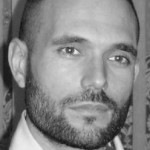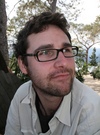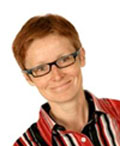Based on ethnographic fieldwork in Niger, Hans Lucht discusses how stranded migrants have become facilitators of the very journey they have failed to make themselves. These connection men, or ‘pushers’ as they say themselves, are now key actors in high-risk migration across the Sahara Desert via Libya to Europe. They have somehow turned all their misfortunes into a form of capital, while awaiting a new chance to go to Europe.
 Hans Lucht is a senior researcher and journalist at the Danish Institute for International Studies (DIIS) in Copenhagen. He holds a PhD in anthropology from the Department of Anthropology, University of Copenhagen. His book on undocumented migration from West Africa to Europe (“Darkness before Daybreak – African Migrants Living on the Margins in Southern Italy Today”) won the 2012 Elliott P. Skinner Book Award from the Association for Africanist Anthropology.
Hans Lucht is a senior researcher and journalist at the Danish Institute for International Studies (DIIS) in Copenhagen. He holds a PhD in anthropology from the Department of Anthropology, University of Copenhagen. His book on undocumented migration from West Africa to Europe (“Darkness before Daybreak – African Migrants Living on the Margins in Southern Italy Today”) won the 2012 Elliott P. Skinner Book Award from the Association for Africanist Anthropology.
Seminar is held in cooperation between the Institute of Social anthropology and IMER BErgen.
Sans-papiers into workers: how historic strikes changed the public face of undocuemented migrants in France
From 2008 to 2010, with the support of a coalition of trade unions and immigrant rights groups under the leadership of the Confédération Générale du Travail (CGT), thousands of France’s undocumented migrant workers conducted strikes and occupied their workplaces, demanding that their employers sponsor their regulatisation applications. Unheard of in French migration and labour history, the mobilization was based on a recent change in legislation allowing employers to solicit the regularisation of a migrant by providing a formal job offer. While the French government’s original intent was to make access to legal status contingent on employer decision alone, union action broadened its scope by bringing the whole employment relationship into the process, including the stakeholders and labour rights built into it by decades of social struggles, such as the right to strike and the right for striking workers to occupy their company without police intrusion. Based on three years of extensive participant observation and more than a hundred in-depth interviews with migrant workers, union and civil rights organization staff and activists, employers in the restaurant, cleaning, temporary staffing and construction industries, and French national and local government officials, our paper considers the strategic challenges encountered by this innovative movement which broke simultaneously with the more traditional repertoires of both French trade unions and the ‘sans-papiers’ movements of the preceding decade.
Related to the topic Chavin has also worked on a documentary film that he will bring with him:
http://www.vezfilm.org/comingforavisit/
http://vimeo.com/53048336
 Sébastien Chauvin is assistant professor of Sociology at the the University of Amsterdam and a researcher at the Amsterdam Institute for Social Science
Sébastien Chauvin is assistant professor of Sociology at the the University of Amsterdam and a researcher at the Amsterdam Institute for Social Science
Research. He was a visiting lecturer at the University of Chicago from 2003 to 2006 and a
lecturer in sociology at the Université Paris 1-Panthéon Sorbonne from 2006 to 2008. He
conducted in-depth ethnographic fieldwork with mostly undocumented Hispanic immigrant
day laborers in the Chicago region, including the staffing industry that employed them, and
the social movements in which they mobilized, as part of his PhD dissertation (EHESS Paris,
2007). Since late 2007, he has been working on a collective study exploring the labor market
experience and following the union-supported mobilization of undocumented immigrant
workers in France. His main research deals with the relationship between civic inequality and
precarious work. He also keeps an active interest in gender and sexuality studies, social capital
and the sociology of elites, social theory, and the sociology of knowledge. He is the author
of a number of articles and book chapters, as well as Les agences de la précarité. Journaliers à Chicago (Paris: Le Seuil, 2010), Introduction aux études sur le genre (with L. Bereni, A. Jaunait, and A.Revillard ; Brussels : De Boeck, 2012, 2nd edition), and On bosse ici, on reste ici: La grève des sans-papiers: une aventure inédite (with P. Barron, A. Bory, N. Jounin, and L. Tourette ; Paris : La découverte, 2011).
Communicating Migration Seminar Series IMER Bergen spring and autumn 2014
The IMER seminar series for 2014 will cover how migration and ethnic relations are communicated in every-day encounters, in mass and social media, in politics and in teaching at the universities. Has the way people talk about migration and migrants in different social contexts changed over time, and in which ways has it changed? How does migration theory and research fit in with other topics and theories in the social sciences, and how do results from migration research inform public debate and policy development? Communicating migration will be discussed from various angles in our seminar series on international migration and ethnic relations during spring and autumn 2014. We welcome papers that touch upon this broad theme from different angles. Historical analyses of change over time in regard to politics and public debate, research foci and disciplinary concerns are specifically welcomed. The seminar series will end with a two-day conference in October/November 2014.
Note: Venue has changed: Anthropology, not Rokkansenteret.
OUT-reach! – Kommunikasjon av «frivillig retur» til irregulære migranter i Norge.
Hvordan kan en stat på best mulig måte gi informasjon om ”frivillig retur” til irregulære migranter? Bør ikke-statlige organisasjoner delta i denne oppgaven, eller vil det å påta seg slike oppgaver undergrave andre funksjoner disse organisasjonene har? Hvordan kommuniseres frivillig retur i dag, og finnes det alternative bedre måter å gjøre dette på?
”Frivillig retur” har fått sterk kritikk av forskere, migranter og organisasjoner for at deltagelse i slike program ofte mangler nettopp det frivillige elementet. Innen forskningen har ‘frivillig retur’ blitt sett som tett knyttet opp til tvangsretur, deportasjon og institusjoner som opprettholder statens grenser. I et slikt perspektiv blir tilbud om «frivillig retur” gjerne sett på som ikke mer enn en mildere variant av tvangsretur og i beste fall en form for obligatorisk retur. «Frivillig retur» er altså tett knyttet opp mot mye av elementer som ikke-statlige organisasjoner ofte har stilt seg kritiske til. Hva er da rasjonale som ligger bak at ulike ikke-statlige hjelpe- og advocacyorganisasjoner eller ulike diaspora- og migrantorganisasjoner tar på seg ansvaret for å formidle ”frivillig retur”? Og på den annen side, er overnevnte årsaker den eneste grunnen til at enkelte organisasjoner ikke velger å gi slik informasjon?
Basert på forskning tilknyttet en kommende UDI rapport i regi av Uni Rokkansenteret vedrørende informasjon om ”frivillig retur” til irregulære migranter utenfor mottak i Norge utforsker Bendixen og Kjærre det etiske og moralske grenselandet som er konteksten for informasjon om frivillig retur, hvordan ulike aktører stiller seg til slikt informasjonsarbeid, og til slutt hvordan de irregulære migrantene selv ser på denne informasjonen i lys av deres livssituasjon i Norge.
Synnøve Kristine Nepstad Bendixsen er postdoktor ved sosial antropologisk institutt i Bergen, og forsker på Uni Rokkansenteret hvor hun er tilknyttet prosjektet Provision of Welfare to Irregular Migrants (PROVIR). Hun har tidligere studert på London Scool of Economics og har en PhD fra Humboldt universitetet (Berlin) og Ecole des Hautes Etudes en Sciences Sociales (Paris). Hennes forskningsfelt er religiøsitetsutforming blant unge Muslimer i Berlin, samt flere forskningsprosjekter innen tema returmigrasjon og irregulær migrasjon, og hun har flere publikasjoner innen disse feltene.
Halvar Andreassen Kjærre er PhD stipendiat ved IMER/Sosialantropologisk institutt i Bergen og har publisert artikler og deltatt på flere forskningsprosjekter innen temaet irregulær/illegalisert migrasjon. Han er også tilknyttet prosjektet PROVIR og jobber for tiden med sin PhD om mobilitet blant irregulære migranter i Schengen/Europa. Tidligere prosjekter har vært ved NTNU samfunnsforskning i Trondheim, Sosiologisk institutt i Oslo, og han jobber nå sammen med Synnøve på overnevnt prosjekt ved Uni Rokkansenteret.
COMMUNICATING MIGRATION SEMINARS: ESPEN HELGESEN – “Your dad is looking for you” – Children’s perspectives on state intervention in immigrant families in Norway
Several recent international news stories have described state-initiated forced separation of children and parents in Norway, illustrating how local decisions in the Child Welfare Service can have widespread ramifications outside the families involved. In this paper I draw on ethnographic fieldwork among immigrant families in Kristiansand, Norway, to show how a group of children responded when one of their friends suddenly disappeared. The secrecy surrounding the inner workings of the Child Welfare Service led the children to frame the incident as a “kidnapping”, and several children expressed fear that they, too, would be separated from their families. Frustrated with the lack of an explanation of what had happened to their friend, the children turned to online worlds, where they could express their fears and concerns by sharing artwork with friends outside the adult gaze.
 Espen Helgesen is a PhD candidate at the Department of Social Anthropology, University of Bergen, currently finishing his thesis on technology-mediated sociality and self-formation among children of immigrants in Norway.
Espen Helgesen is a PhD candidate at the Department of Social Anthropology, University of Bergen, currently finishing his thesis on technology-mediated sociality and self-formation among children of immigrants in Norway.
Communicating Migration Seminar Series IMER Bergen spring and autumn 2014
The IMER seminar series for 2014 will cover how migration and ethnic relations are communicated in every-day encounters, in mass and social media, in politics and in teaching at the universities. Has the way people talk about migration and migrants in different social contexts changed over time, and in which ways has it changed? How does migration theory and research fit in with other topics and theories in the social sciences, and how do results from migration research inform public debate and policy development? Communicating migration will be discussed from various angles in our seminar series on international migration and ethnic relations during spring and autumn 2014. We welcome papers that touch upon this broad theme from different angles. Historical analyses of change over time in regard to politics and public debate, research foci and disciplinary concerns are specifically welcomed. The seminar series will end with a two-day conference in October/November 2014.
IMER Seminar:
Elaine Chase and Jenny Allsopp: The ‘tactics’ of time and status: Young people subject to immigration control making the transition to ‘adulthood’ in the UK
Young people who arrive in the UK from outside Europe without a parent or legal guardian are institutionally categorised according to a range of possible legal statuses and usually afforded time-limited Leave to Remain in the UK. These categorisations are associated with specific welfare entitlements which tend to diminish over time and become particularly uncertain as young people transition into ‘adulthood’. Situated within a broader research programme examining the link between migration, ‘wellbeing’ and ‘futures’, this paper examines the multiple transitions imposed on young people subject to immigration control as they approach the age of 18 and beyond, (from child to ‘adult’, from being accorded a temporary residence permit to more permanent leave to remain or from legality to ‘illegality’) and the implications for their access to various dimensions of welfare provision. The paper shows how different components of the ‘state’ have time limitations at their disposal to control access to welfare and state support according to chronological age. From young people’s perspectives, such ‘tactics’ fundamentally control their trajectories and future prospects unless they can formulate strategies of their own to counter such tactics.
Read more about Elaine Chase here
Read more about Jenny Allsopp here
Plural policing and the safety–security nexus in urban governance
Based on a study of policy frames in urban politics in Sweden, Malmö in particular, this article discusses the safety–security nexus in urban governance. It argues that perceived safety figures as an index of order and integration, and security becomes part and parcel of an expanded cohesion agenda which chain-links criminal justice, immigration control and civic integration. The expanded cohesion agenda in urban governance involves plural urban policing enabled by partnership agreements between the police and local authorities. The article demonstrates how force-based, pre-emptive crime-fighting is intertwined with preventative empowerment programmes; the ‘will to power’ is embedded in ‘the will to empower’. The preferred solution to social problems is extended force-based policing in combination with more police involvement in ‘social’ governance. It is argued that the expanded social cohesion agenda works to ‘criminalize’ specific subpopulations by replacing ‘social’ welfare politics with crime prevention programmes. Under an expanded cohesion agenda, crime prevention has less to do with preventing people from violating the law and more to do with securing the social order. Moreover, it is argued that security politics relates to a broader urban politics aimed at nurturing prosperous diversity considered to benefit the city as a whole, at the cost of problematic difference. In conclusion the article argues that urban security politics lends itself to old welfare state structures, even as responsibility for social crime prevention is devolved ‘downwards’ and distributed across and array of agencies. The social democratic legacy – the revised welfare state – seems to offer favorable conditions for plural policing of minority groups in the city.
 Randi Gressgård is professor at the Centre for Women’s and Gender Research (SKOK), and affiliated with the research unit International Migration and Ethnic Relations (IMER), University of Bergen. Her research interests include migration & minority studies, gender & sexuality studies and urban studies. Among her recent publications are Multicultural Dialogue: Dilemmas, Paradoxes, Conflicts (New York and Oxford: Berghahn Books, 2010/2012) and ‘The power of (re)attachment in urban strategy: Interrogating the framing of social sustainability in Malmö’ (Environment and Planning A 2014, vol. 46).
Randi Gressgård is professor at the Centre for Women’s and Gender Research (SKOK), and affiliated with the research unit International Migration and Ethnic Relations (IMER), University of Bergen. Her research interests include migration & minority studies, gender & sexuality studies and urban studies. Among her recent publications are Multicultural Dialogue: Dilemmas, Paradoxes, Conflicts (New York and Oxford: Berghahn Books, 2010/2012) and ‘The power of (re)attachment in urban strategy: Interrogating the framing of social sustainability in Malmö’ (Environment and Planning A 2014, vol. 46).
